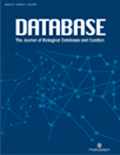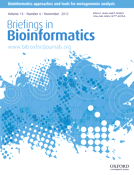
Database-The Journal of Biological Databases and Curation
metrics 2024
Elevating Standards in Data Accessibility and Usability
Introduction
Database - The Journal of Biological Databases and Curation, published by Oxford University Press, stands at the forefront of the rapidly evolving fields of biological data management and curation. Since its inception in 2009, this open access journal has become a pivotal resource for researchers and professionals eager to explore the intricate world of biological databases. With an impressive impact factor, it ranks in the Q1 quartile across significant disciplines such as Agricultural and Biological Sciences, Biochemistry, Genetics and Molecular Biology, Information Systems, and Medicine as of 2023. This prestigious standing reflects its commitment to high-quality research and innovation. The journal not only provides a platform for original research articles, reviews, and case studies but also aims to facilitate discussion on best practices in database design and curation. By bridging the gap between data generation and utilization, it plays an essential role in enhancing the accessibility and usability of biological data, making it indispensable for scholars and students who are navigating these complex domains.
Metrics 2024
 1.56
1.56 3.40
3.40 4.20
4.20 82
82Metrics History
Rank 2024
Scopus
IF (Web Of Science)
JCI (Web Of Science)
Quartile History
Similar Journals

GigaScience
Fostering Global Collaboration in Computational Life SciencesGigaScience, published by Oxford University Press, is a pioneering open-access journal that has made significant strides in the fields of Medicine, Health Informatics, and Computer Science Applications since its inception in 2012. With an impressive impact factor and a consistent ranking in the Q1 category across multiple disciplines, GigaScience is recognized as an essential resource for researchers dedicated to advancing data-driven science. The journal's commitment to high-quality research is reflected in its Scopus rankings, placing it in the top 5% and 4% of its categories. As an open-access journal, GigaScience ensures that vital research is accessible to a global audience, fostering collaboration and innovation in an increasingly interconnected research landscape. Researchers, professionals, and students alike will find GigaScience instrumental in exploring the intersection of computational technology and life sciences, as it frequently publishes groundbreaking studies that shape future inquiries in these dynamic fields.

BRIEFINGS IN BIOINFORMATICS
Transforming Data into Discoveries in Life SciencesBRIEFINGS IN BIOINFORMATICS is a premier academic journal dedicated to the dynamic field of bioinformatics, published by Oxford University Press. With a prestigious standing reflected in its Q1 quartile rankings in both Information Systems and Molecular Biology, this journal serves as an essential resource for researchers, professionals, and students eager to explore the intersection of biology and computational sciences. The journal not only publishes high-impact research articles but also reviews and critical commentaries that push the boundaries of understanding in bioinformatics. As it converges its objectives towards fostering innovation and knowledge dissemination from 2000 to 2024, BRIEFINGS IN BIOINFORMATICS offers rich insights that remain pivotal to advancements in genomic studies, data integration, and computational tools. Its ranking in the top percentiles of Scopus—30th among 394 in Computer Science and 44th among 410 in Molecular Biology—underscores the journal's influential presence in the academic community. Engaging with the latest research and trends, this journal is integral for anyone invested in the future of life sciences and data analytics.

Proteome Science
Innovating Biological Insights Through ProteomicsProteome Science is an esteemed academic journal specializing in the field of proteomics, providing a platform for advanced research and discussions surrounding the structure, function, and dynamics of proteins in biological systems. Published by BMC, a reputable publisher recognized for its commitment to open-access publishing, Proteome Science has been disseminating pivotal research findings since its inception in 2003. Targeted towards researchers, professionals, and students in biochemistry and molecular biology, the journal aims to foster collaboration and innovation within the scientific community. While it currently holds a Q3 quartile ranking in both Biochemistry and Molecular Biology categories, its impactful contributions to the field are reflected in its accessibility, as evidenced by its open access policy. By embracing collaborative research methodologies and providing a platform for novel findings, Proteome Science plays a crucial role in advancing the understanding of proteomic analyses, catering to a global audience that values groundbreaking scientific discovery.

BMC GENOMICS
Empowering discoveries in biotechnology and genetics.BMC Genomics is a premier open-access journal dedicated to advancing the field of genomics through the dissemination of high-quality research articles. Published by BMC, a renowned leader in open-access publishing, this journal has built a solid reputation since its inception in 2000, making significant contributions to the areas of biotechnology and genetics. Holding a prestigious Q1 ranking in Biotechnology and Q2 in Genetics as of 2023, it serves as an essential platform for researchers, professionals, and students alike, facilitating the exchange of innovative ideas and data. With an impactful presence in the Scopus rankings, BMC Genomics currently stands at Rank #90/347 in Genetics, reflecting its influence in the scientific community. Researchers are encouraged to explore the vast array of scholarly articles and engage with cutting-edge genomics research that is crucial for the evolution of various applications in medicine, agriculture, and environmental science. With its open access model, BMC Genomics ensures that groundbreaking research is freely available, fostering collaboration and accelerating scientific discovery on a global scale.

Bioinformatics Advances
Innovative Insights for Computational BiologyBioinformatics Advances, published by Oxford University Press, is an esteemed academic journal that serves as a vital platform for the dissemination of innovative research in the rapidly evolving fields of bioinformatics and computational biology. With a promising E-ISSN of 2635-0041, this journal has made significant strides since its inception in 2021, achieving a commendable Q1 ranking in both the Computer Science Applications and Genetics categories, alongside respectable Q2 rankings in Molecular Biology and Structural Biology as of 2023. Though currently not an open-access publication, its critical insights cater to an audience keen on advancing knowledge and technology in genomic studies and data analytics. The journal emphasizes high-quality research and aims to facilitate the integration of computational techniques within biological sciences, making it an essential resource for researchers, professionals, and students alike who seek to stay at the forefront of bioinformatics advancements.

JOURNAL OF BIOMEDICAL INFORMATICS
Pioneering research at the crossroads of technology and medicine.JOURNAL OF BIOMEDICAL INFORMATICS, published by Academic Press Inc. Elsevier Science, is a premier peer-reviewed journal dedicated to the integration of computer science and health informatics to advance the field of biomedical engineering and healthcare. With its ISSN 1532-0464 and E-ISSN 1532-0480, this influential journal has established itself with an impressive impact factor, reflecting its high-quality research contributions. Recognized within the top quartile (Q1) of both Computer Science Applications and Health Informatics for 2023, the journal ranks #135 out of 817 in Computer Science Applications and #25 out of 138 in Health Informatics according to Scopus metrics. Offering open access options, it fosters extensive dissemination and accessibility of groundbreaking research findings to the scientific community. As a scholarly platform from 2001 to 2024, it is engineered to cater to the educational needs of researchers, professionals, and students, promoting innovative studies that bridge the gap between technology and healthcare.

Frontiers in Bioinformatics
Connecting Ideas, Driving Innovation in BioinformaticsFrontiers in Bioinformatics is a leading academic journal dedicated to advancing the field of bioinformatics by publishing high-quality research and review articles. Published by FRONTIERS MEDIA SA, this open-access journal aims to foster innovative research, promote collaborative initiatives, and provide a platform for the dissemination of findings related to computational biology, biostatistics, and the intersection of bioinformatics with other biological disciplines. With a focus on promoting accessibility and visibility of research, Frontiers in Bioinformatics operates under a rigorous peer-review process, ensuring that all published content meets the highest academic standards. The journal has shown a commendable rank across various Scopus categories, including Mathematics, Computational Mathematics, and multiple dimensions of Biochemistry and Molecular Biology, indicating its relevance and impact within the research community. Researchers, professionals, and students will find this journal invaluable for staying abreast of the latest developments and breakthroughs in bioinformatics, enhancing their studies and professional projects.

Molecular Systems Biology
Fostering Innovation in Systems Biology ResearchMolecular Systems Biology, published by SpringerNature, is a premier open access journal that has been a cornerstone in advancing the fields of biological science since its inception in 2005. With its ISSN 1744-4292, this journal exemplifies high scholarly standards, boasting an impressive suite of impact factors, including Q1 rankings across various disciplines such as Agricultural and Biological Sciences, Biochemistry, Genetics and Molecular Biology, and more, highlighting its significant contribution to the scientific community. The journal offers robust access options to facilitate innovative research dissemination, reaching a global audience while maintaining a commitment to fostering collaboration and dialogue among researchers, professionals, and students. With a focus on integrating quantitative approaches to biological systems, Molecular Systems Biology plays a vital role in addressing complex biological questions, paving the way for groundbreaking discoveries and advancements in healthcare, environmental sustainability, and functional genomics.

KNOWLEDGE AND INFORMATION SYSTEMS
Advancing the Frontiers of Information ScienceKNOWLEDGE AND INFORMATION SYSTEMS, published by SPRINGER LONDON LTD, is a distinguished journal in the field of information systems, artificial intelligence, and human-computer interaction. With its ISSN 0219-1377 and E-ISSN 0219-3116, this journal has built a robust reputation since its inception, featuring a convergence of valuable research from 2005 through 2024. Catering to a diverse academic audience, it is classified among the leading journals in its category, proudly holding a Q1 ranking in Information Systems and Q2 rankings in multiple other domains. The journal aims to publish cutting-edge research that not only advances theoretical understanding but also provides practical applications within these rapidly evolving fields. Although it is not an Open Access journal, subscribers can access a wealth of knowledge critical for researchers, practitioners, and students looking to enhance their expertise. With a 2023 Scopus rank placing it within the 66th percentile for Information Systems, KNOWLEDGE AND INFORMATION SYSTEMS is an invaluable resource for those committed to pushing the frontiers of knowledge in technology and information science.

DATA & KNOWLEDGE ENGINEERING
Elevating Understanding in Information SystemsData & Knowledge Engineering is a prestigious, peer-reviewed journal dedicated to the fields of data management, information systems, and knowledge engineering. Published by Elsevier in the Netherlands, this journal serves as a critical resource for researchers, professionals, and students alike, offering a platform for high-quality, original research and innovative approaches in the realm of data-driven technologies and methodologies. With a considerable impact factor and classified in the Q2 quartile for Information Systems and Management, it ranks 47th out of 148 journals in its category, placing it in the esteemed 68th percentile according to Scopus metrics. Data & Knowledge Engineering covers a wide array of topics including database systems, data mining, and knowledge representation, ensuring that it remains at the forefront of advancing understanding and application in these dynamic fields. Engage with compelling articles and significant findings published since its inception in 1985, as the journal continues to shape the future of data-centric research up to 2024 and beyond.